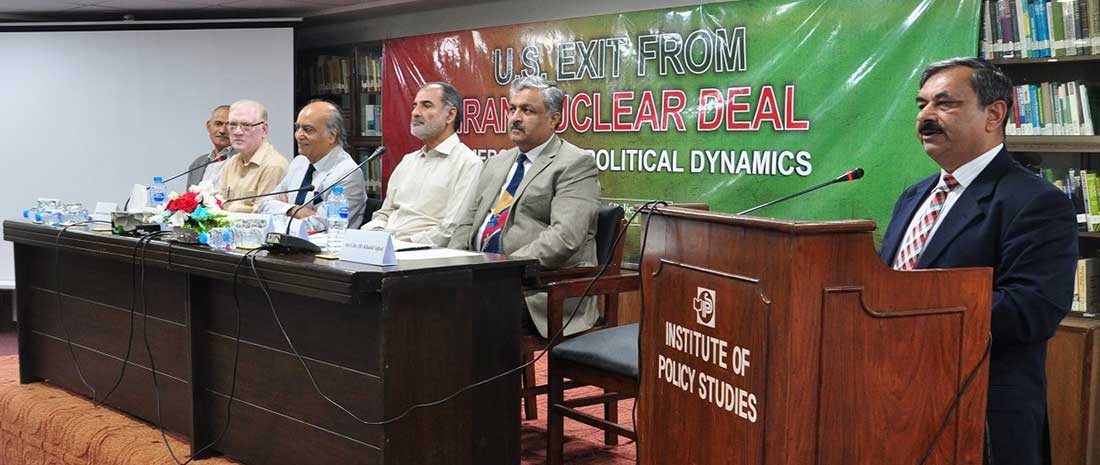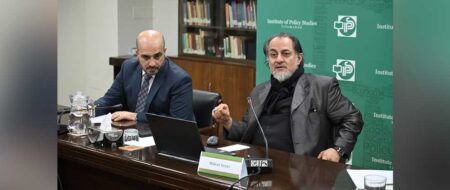U.S. Exit from Iran Nuclear Deal: Emerging Geo-Political Dynamics
US exit from Iran nuclear deal criticized by experts
Pakistan should adopt a balanced and neutral approach to support Iran in its time of need after the unilateral exit of the United States from Iran nuclear deal according to a panel of security and diplomacy experts at a seminar titled ‘US Exit from Iran Nuclear Deal: Emerging Geo-Political Dynamics’. The seminar was jointly organized by Institute of Policy Studies (IPS) and Institute of Maritime Affairs (IMA) on September 5, 2018.
The session was chaired by Ambassador (r) Khalid Mahmood, chairman, Institute of Strategic Studies, Islamabad (ISSI) while the speakers included Commodore (r) Baber Bilal, Director National Center for Maritime Policy Research (NCMPR), Air Commodore (r) Khalid Iqbal, chairman, IPS committee on Pakistan’s Geo-Strategic and Geo-Political Dynamics, Ambassador (r) Tajammul Altaf, senior research associate at IPS and Cdr (retd) Dr Azhar Ahmad, senior IPS associate & HOD, Humanities and Social Sciences, Bahria University, Islamabad.
The speakers were of the view that backing out from the Joint Comprehensive Plan of Action (JCPO) has severely damaged the US reputation as refusing to honor an international agreement that has been ratified by the UN Security Council. Added to that, it manifested the declining power of the ‘Cold War victor’ where close allies such as the EU refused to follow the American lead, promising to honor their agreement. At the regional level, the decision caused an escalation of tensions between Iran and Saudi Arabia, to what experts have called the ‘New Middle East Cold War.’
President Trump’s controversial decisions derived a wedge between friends and allies, where he repeatedly attacked the North Atlantic Treaty Organization (NATO) and Trans-Atlantic Partnership agreement on the pretext of being a great hurdle in his quest for making ‘America Great Again!’ It seemed as if that the days of the world of unipolarity had been numbered when EU refused to follow the lead of United States in abrogating the nuclear deal.
Bilal, while delivering the keynote presentation, viewed that Trump administrations’ objectives behind withdrawing from the deal were to please Israel, pressurize Iran financially, keeping ‘Iran threat’ alive in the Middle East to benefit its arms sales, manage oil markets, and win the next elections.
He said that the US’ withdrawal from the deal was also supported by majority of Gulf countries, which viewed Iran as a threat even greater than Israel.
Talking about Pakistan, the speaker said that it should cautiously practice a balanced relationship with it vis-à-vis Saudi Arabia and India.
Commodore (retd) Baber Bilal also pointed out at the opportunity for the emergence of a new block with China, Russia Pakistan, Iran, and Turkey as member countries, all of whom were faced with somewhat similar circumstances when it comes to sanctions imposed by the US.
The speaker viewed that the leverage with Iran could be exploited under CPEC project opportunities, even may be by letting China take the lead and then following its path. The introduction of the idea to have Chabahar port complementing Gwadar port instead of competing with it could also pave way in this regard.
Ambassador (retd) Khalid Mahmood echoed Bilal’s opinions, maintaining that the US was trying to strangle Iran in every way but its withdrawal from the deal was also having an adverse effect on its credibility. The situation, according to him, was also a test for Pakistan’s diplomacy and the country should opt for a cautious support of Iran while balancing its relations with Saudi Arabia.
Ambassador (retd) Tajammul Altaf said Trump’s policies of alienating the US from the world were putting the entire architecture of international system, which was put together by his predecessors, at stake.
Air Commodore (retd) Khalid Iqbal said Pakistan and Iran have a unique opportunity to come closer and form stronger bonds under the current circumstances.
Dr. Azhar Ahmad believed that the objectives of the US were to maintain its uni-polar hegemony by containing China and Russia from taking its place. He opined that US had arguably been a war economy and the continuation of wars have constantly been in the country’s interests. He pointed that though the deal scrap posed challenges for Iran, yet at the same time could strengthen the country by leading to the creation of new international and regional alignments.












